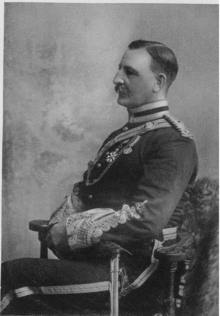R. S. F. Walker
| Robert Sandilands Frowd Walker | |
|---|---|

Lieut.-Colonel R.S. Frowd Walker C.M.G.
|
|
| Born | 13 May 1850 Chester, England |
| Died | 16 May 1917 Knockholt, Kent, England |
| Rank | Lieutenant colonel |
| Awards | C.M.G. |
Lt. Col. Robert Sandilands Frowd Walker, C.M.G., (also known as R. S. F. Walker) (13 May 1850 – 16 May 1917) was a prominent figure in Malaya during the British colonial era in the late 19th century.
During his youth he was an amateur sportsman, and played three times for the English football XI against Scotland, scoring four goals, in the 1870 to 1872 representative matches.
Walker was born in Chestercastle, (in the Great Boughton registration district), in Chester, the son of John and Camilla Walker. He was educated at Brentwood School, Essex before entering the Royal Military College, Sandhurst.
At Sandhurst, he showed himself to be a keen all-round sportsman, representing the college at athletics in 1869 and 1870 in competitions with the Royal Military Academy, Woolwich. He played for the Sandhurst cricket team in 1869, including the match against the Royal Military Academy, Woolwich in May. The following year he was captain of the cricket team. In May 1870, he won the 120 yards hurdles and the pole jump in the annual athletics competition against the Woolwich Academy.
On graduating from Sandhurst in 1870, he was awarded the Sword of Honour which was presented to him by the Duke of Cambridge, who was then Commander-in-Chief. He continued to use the sword throughout his career and had it re-hilted to conform to the 1895 regulations. This sword is probably the one depicted in the statue of Walker that stands outside the Perak Museum at Taiping.
After leaving Sandhurst, he joined the Clapham Rovers Football Club and was also a member of the Wanderers club. In November 1870, he was selected by C. W. Alcock to represent "England" in the second "pseudo-international" match against a Scottish XI. He scored England's goal in a 1–0 victory; according to the match reports "[following] a well-executed run-down by C.W. Alcock, in conjunction with a final kick from the foot of R.S.F. Walker, enforced the surrender of the Scottish goal" and "barely ten minutes had elapsed before a neat run down by C.W. Alcock, resulted in a goal to the side of England, the final kick which secured the coveted honour for the South being administered by R.S.F. Walker".
...
Wikipedia
